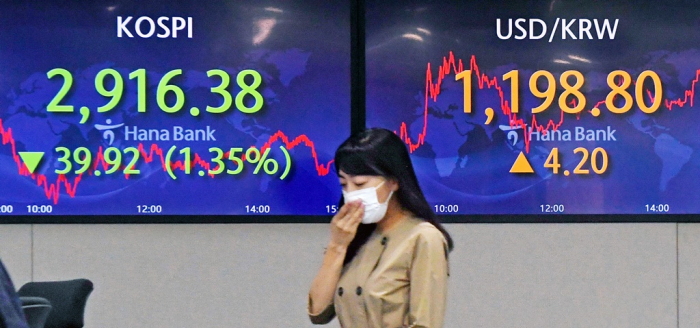The South Korean won weakened past the psychologically important 1,200 per dollar mark for the first time in 15 months as growing worries about global inflation and expectations of a tighter US monetary policy spurred equity outflow.
The won on Oct. 12 dropped to as low as 1,200.4 against the dollar in the domestic currency market, the softest point since July 28, 2020 when the South Korean unit fell to 1,201. It ended the local market down 0.4% at 1,198.8, also the weakest domestic close since July 24, 2020.
The South Korean unit came under pressure from broad strength in the dollar with the dollar index up to 94.326 on Oct. 11 from 82.449 early in September. Rising oil prices also hurt the won.
The Kospi lost 1.35% to close at 2,916.38 as foreign investors sold a net 820 billion won ($685 million) worth of stocks in the country’s main bourse. They have net dumped more than 1.3 trillion won in total in the first 12 days of the month.
“The break of the 1,200 level in the dollar/won, the imminent tapering and inflationary pressures maintained the preference for safer assets,” said Mirae Asset Securities analyst Kim Seok-hwan, referring to the expected US Federal Reserve’s step to scale back asset purchases.
The recent won’s weakness was seen as excessive, however, given South Korea’s sound economic fundamentals, market participants said.
Bank of Korea Governor Lee Ju-yeol said the won weakened more rapidly than other currencies, adding “we are planning to stabilize the market if necessary.”
BREAK OF 1,200 NOT A SIGN OF CRISISAs the won has weakened past the 1,200 level previously during a global financial or economic crisis, as well as when the COVID-19 pandemic hit South Korea, it is prompting concerns that the break of the level may be a signal of a meltdown in the economy and financial markets. But the current fundamentals of Asia’s fourth-largest economy are healthy, analysts said.
South Korea reported a $7.5 billion current account surplus in August, extending the surplus spree to 16 consecutive months. Exports in the first 10 days of October jumped 63.5% on-year to $15.2 billion. Foreign reserves also rose to $464 billion at end-September, reporting a record high for a third straight month.
Despite those bullish factors, the won could not help weakening as accelerating inflation amid surging oil prices is expected to prompt the Fed to tighten monetary policy more aggressively.
The 10-year US Treasury yield on Oct. 11 rose to 1.628%, the highest since May 20, 2020. The yield was predicted to jump to 2% by year-end, US investment banks forecast.
The South Korean currency came under further pressure as China’s economic growth is expected to slow this year due to the deepening debt crisis involving real estate developer Evergrande Group as well as power outages.
Some IBs lowered their growth forecasts for China’s economy, South Korea’s top overseas market. Goldman Sachs cut its growth forecast for 2021 to 7.8% from 8.2%, while Nomura slashed its prediction to 7.7% from 8.2%.
Those grim factors caused some expectations that the South Korean currency could weaken to 1,250 per dollar.
South Korean companies were accumulating dollars that they received for exports instead of selling to buy the won. The country’s corporate dollar deposits increased $940 million to $63.2 billion in August.
“Given tough situations in other countries such as China, more companies are stocking up dollars. Their demand for funds to exchange dollars into won also declined as they have strong capabilities to raise won in cash,” said a source at the foreign exchange market.
Write to Ik-Hwan Kim and Eun-Seo Koo at
lovepen@hankyung.comJongwoo Cheon edited this article.





